Recent Developments and Trends in Hospitality Industry
VerifiedAdded on 2019/12/03
|14
|4444
|168
Report
AI Summary
The provided content discusses recent developments and potential trends that are influencing and affecting the hospitality industry. The articles highlight various aspects of the industry, including the importance of providing memorable customer experiences, innovation in outdoor hospitality parks, and the role of workplace fun in employee behaviors. Additionally, the papers examine human resource management practices, job satisfaction, and turnover rates, as well as the impact of attitudes versus experience on employee behaviors. Furthermore, the articles touch upon issues such as food safety practices, traditional clubs, and critical hospitality research. Overall, the content provides insights into the current state of the industry and its future directions.
Contribute Materials
Your contribution can guide someone’s learning journey. Share your
documents today.
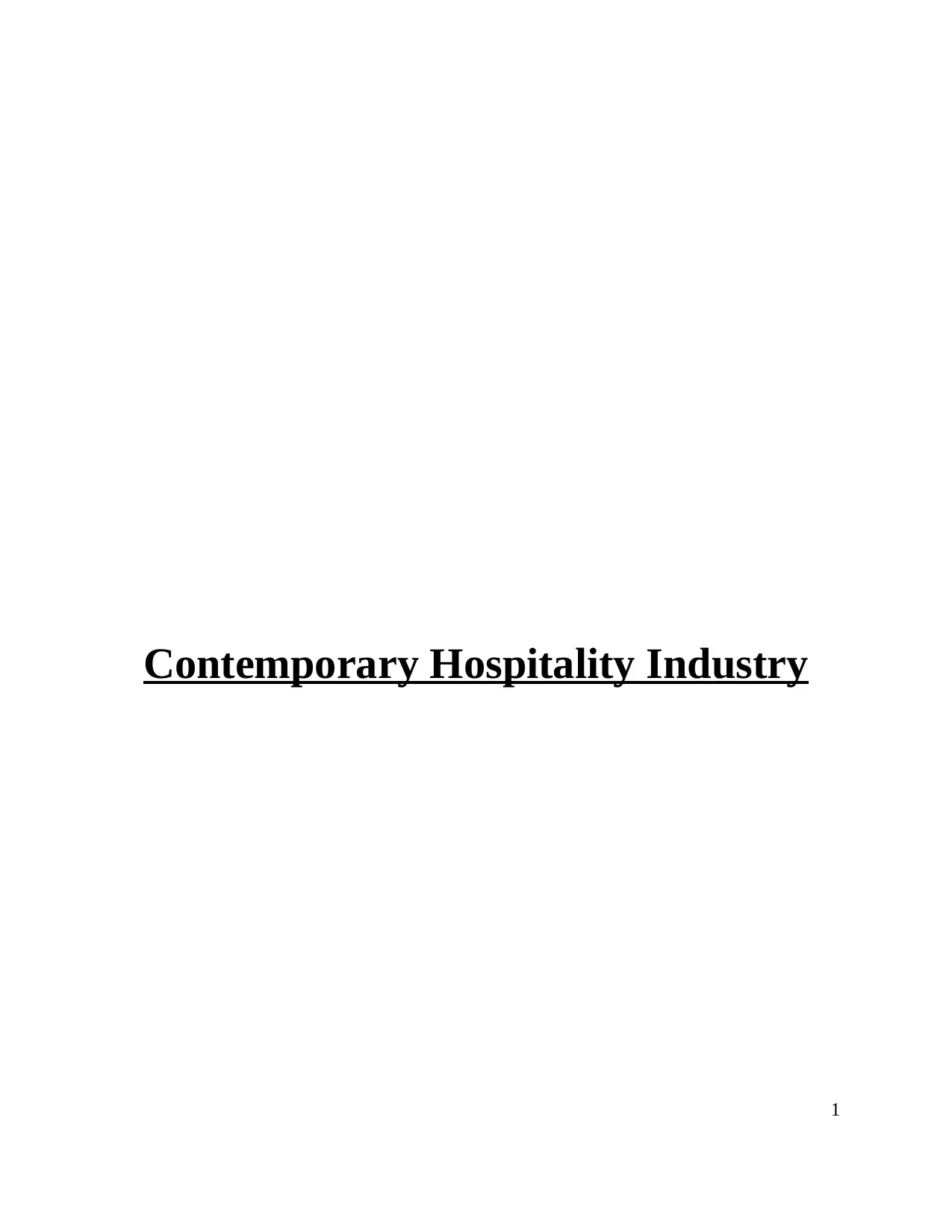
Contemporary Hospitality Industry
1
1
Secure Best Marks with AI Grader
Need help grading? Try our AI Grader for instant feedback on your assignments.
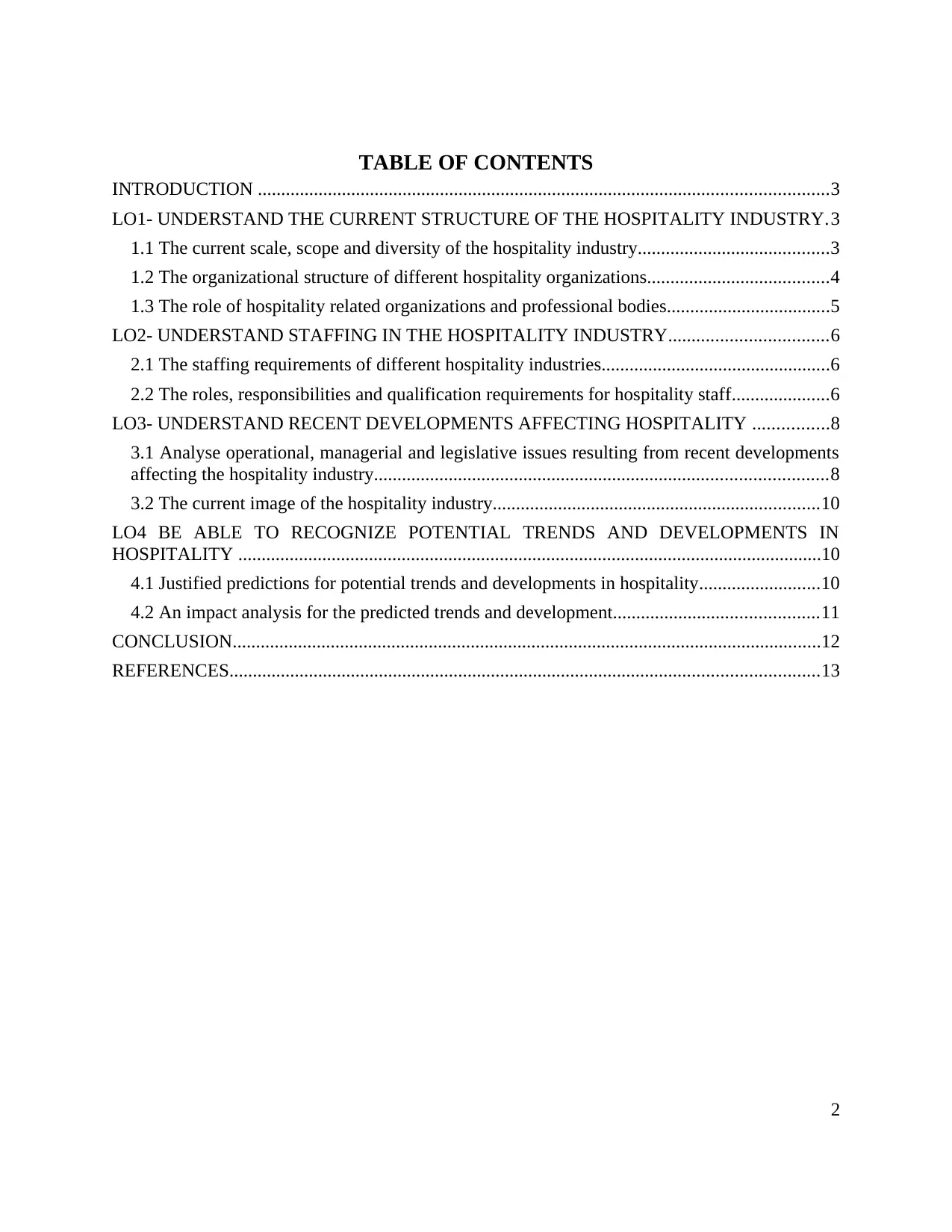
TABLE OF CONTENTS
INTRODUCTION ..........................................................................................................................3
LO1- UNDERSTAND THE CURRENT STRUCTURE OF THE HOSPITALITY INDUSTRY.3
1.1 The current scale, scope and diversity of the hospitality industry.........................................3
1.2 The organizational structure of different hospitality organizations.......................................4
1.3 The role of hospitality related organizations and professional bodies...................................5
LO2- UNDERSTAND STAFFING IN THE HOSPITALITY INDUSTRY..................................6
2.1 The staffing requirements of different hospitality industries.................................................6
2.2 The roles, responsibilities and qualification requirements for hospitality staff.....................6
LO3- UNDERSTAND RECENT DEVELOPMENTS AFFECTING HOSPITALITY ................8
3.1 Analyse operational, managerial and legislative issues resulting from recent developments
affecting the hospitality industry.................................................................................................8
3.2 The current image of the hospitality industry......................................................................10
LO4 BE ABLE TO RECOGNIZE POTENTIAL TRENDS AND DEVELOPMENTS IN
HOSPITALITY .............................................................................................................................10
4.1 Justified predictions for potential trends and developments in hospitality..........................10
4.2 An impact analysis for the predicted trends and development............................................11
CONCLUSION..............................................................................................................................12
REFERENCES..............................................................................................................................13
2
INTRODUCTION ..........................................................................................................................3
LO1- UNDERSTAND THE CURRENT STRUCTURE OF THE HOSPITALITY INDUSTRY.3
1.1 The current scale, scope and diversity of the hospitality industry.........................................3
1.2 The organizational structure of different hospitality organizations.......................................4
1.3 The role of hospitality related organizations and professional bodies...................................5
LO2- UNDERSTAND STAFFING IN THE HOSPITALITY INDUSTRY..................................6
2.1 The staffing requirements of different hospitality industries.................................................6
2.2 The roles, responsibilities and qualification requirements for hospitality staff.....................6
LO3- UNDERSTAND RECENT DEVELOPMENTS AFFECTING HOSPITALITY ................8
3.1 Analyse operational, managerial and legislative issues resulting from recent developments
affecting the hospitality industry.................................................................................................8
3.2 The current image of the hospitality industry......................................................................10
LO4 BE ABLE TO RECOGNIZE POTENTIAL TRENDS AND DEVELOPMENTS IN
HOSPITALITY .............................................................................................................................10
4.1 Justified predictions for potential trends and developments in hospitality..........................10
4.2 An impact analysis for the predicted trends and development............................................11
CONCLUSION..............................................................................................................................12
REFERENCES..............................................................................................................................13
2
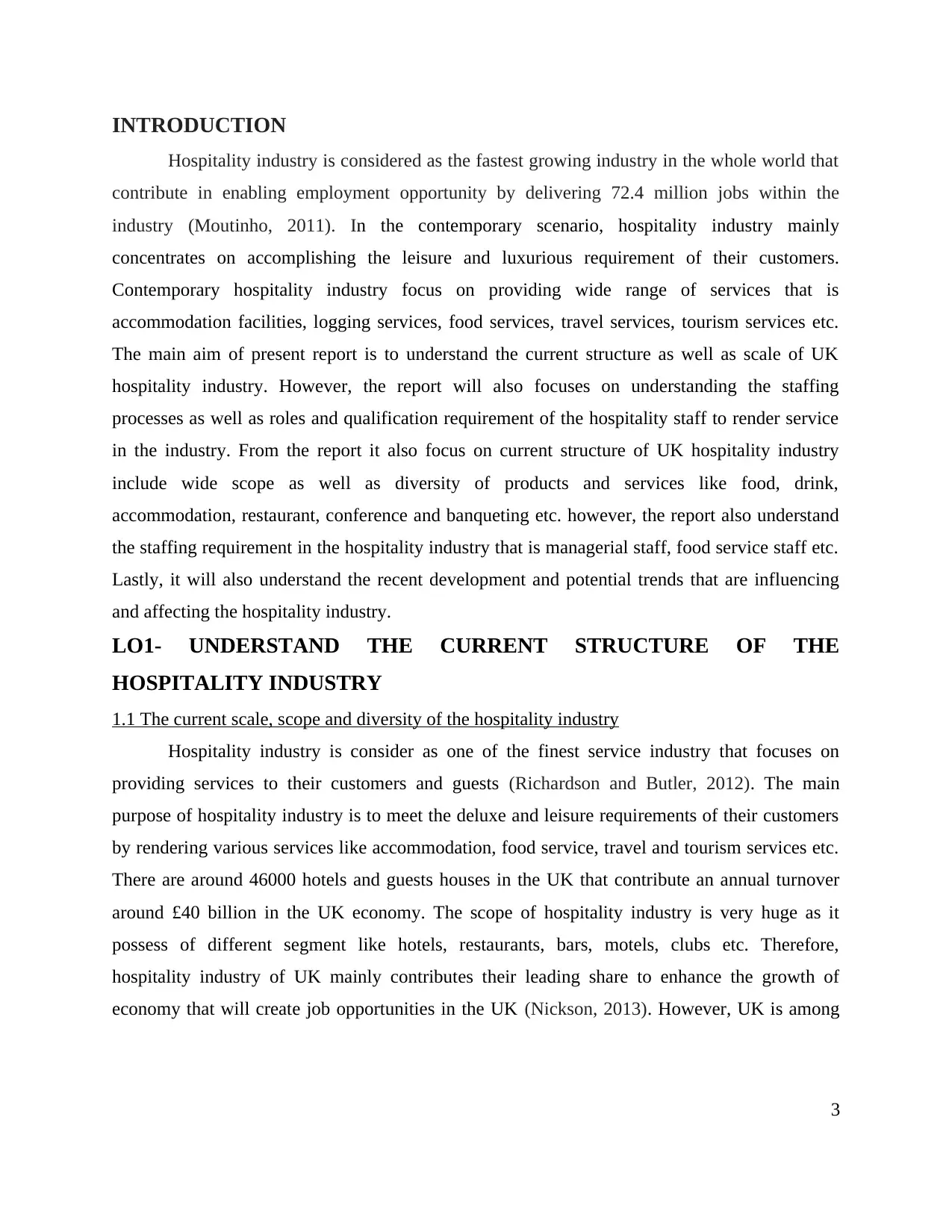
INTRODUCTION
Hospitality industry is considered as the fastest growing industry in the whole world that
contribute in enabling employment opportunity by delivering 72.4 million jobs within the
industry (Moutinho, 2011). In the contemporary scenario, hospitality industry mainly
concentrates on accomplishing the leisure and luxurious requirement of their customers.
Contemporary hospitality industry focus on providing wide range of services that is
accommodation facilities, logging services, food services, travel services, tourism services etc.
The main aim of present report is to understand the current structure as well as scale of UK
hospitality industry. However, the report will also focuses on understanding the staffing
processes as well as roles and qualification requirement of the hospitality staff to render service
in the industry. From the report it also focus on current structure of UK hospitality industry
include wide scope as well as diversity of products and services like food, drink,
accommodation, restaurant, conference and banqueting etc. however, the report also understand
the staffing requirement in the hospitality industry that is managerial staff, food service staff etc.
Lastly, it will also understand the recent development and potential trends that are influencing
and affecting the hospitality industry.
LO1- UNDERSTAND THE CURRENT STRUCTURE OF THE
HOSPITALITY INDUSTRY
1.1 The current scale, scope and diversity of the hospitality industry
Hospitality industry is consider as one of the finest service industry that focuses on
providing services to their customers and guests (Richardson and Butler, 2012). The main
purpose of hospitality industry is to meet the deluxe and leisure requirements of their customers
by rendering various services like accommodation, food service, travel and tourism services etc.
There are around 46000 hotels and guests houses in the UK that contribute an annual turnover
around £40 billion in the UK economy. The scope of hospitality industry is very huge as it
possess of different segment like hotels, restaurants, bars, motels, clubs etc. Therefore,
hospitality industry of UK mainly contributes their leading share to enhance the growth of
economy that will create job opportunities in the UK (Nickson, 2013). However, UK is among
3
Hospitality industry is considered as the fastest growing industry in the whole world that
contribute in enabling employment opportunity by delivering 72.4 million jobs within the
industry (Moutinho, 2011). In the contemporary scenario, hospitality industry mainly
concentrates on accomplishing the leisure and luxurious requirement of their customers.
Contemporary hospitality industry focus on providing wide range of services that is
accommodation facilities, logging services, food services, travel services, tourism services etc.
The main aim of present report is to understand the current structure as well as scale of UK
hospitality industry. However, the report will also focuses on understanding the staffing
processes as well as roles and qualification requirement of the hospitality staff to render service
in the industry. From the report it also focus on current structure of UK hospitality industry
include wide scope as well as diversity of products and services like food, drink,
accommodation, restaurant, conference and banqueting etc. however, the report also understand
the staffing requirement in the hospitality industry that is managerial staff, food service staff etc.
Lastly, it will also understand the recent development and potential trends that are influencing
and affecting the hospitality industry.
LO1- UNDERSTAND THE CURRENT STRUCTURE OF THE
HOSPITALITY INDUSTRY
1.1 The current scale, scope and diversity of the hospitality industry
Hospitality industry is consider as one of the finest service industry that focuses on
providing services to their customers and guests (Richardson and Butler, 2012). The main
purpose of hospitality industry is to meet the deluxe and leisure requirements of their customers
by rendering various services like accommodation, food service, travel and tourism services etc.
There are around 46000 hotels and guests houses in the UK that contribute an annual turnover
around £40 billion in the UK economy. The scope of hospitality industry is very huge as it
possess of different segment like hotels, restaurants, bars, motels, clubs etc. Therefore,
hospitality industry of UK mainly contributes their leading share to enhance the growth of
economy that will create job opportunities in the UK (Nickson, 2013). However, UK is among
3
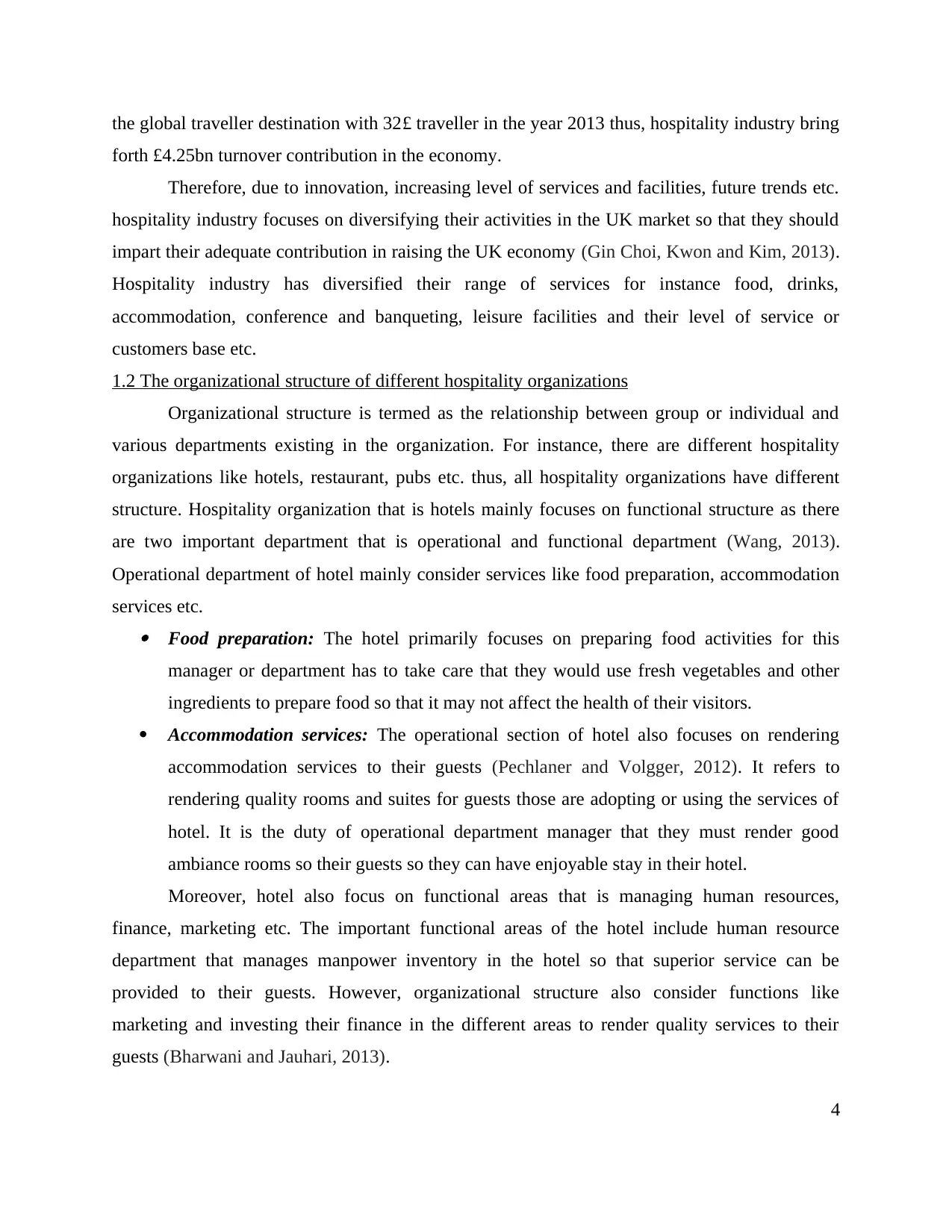
the global traveller destination with 32£ traveller in the year 2013 thus, hospitality industry bring
forth £4.25bn turnover contribution in the economy.
Therefore, due to innovation, increasing level of services and facilities, future trends etc.
hospitality industry focuses on diversifying their activities in the UK market so that they should
impart their adequate contribution in raising the UK economy (Gin Choi, Kwon and Kim, 2013).
Hospitality industry has diversified their range of services for instance food, drinks,
accommodation, conference and banqueting, leisure facilities and their level of service or
customers base etc.
1.2 The organizational structure of different hospitality organizations
Organizational structure is termed as the relationship between group or individual and
various departments existing in the organization. For instance, there are different hospitality
organizations like hotels, restaurant, pubs etc. thus, all hospitality organizations have different
structure. Hospitality organization that is hotels mainly focuses on functional structure as there
are two important department that is operational and functional department (Wang, 2013).
Operational department of hotel mainly consider services like food preparation, accommodation
services etc. Food preparation: The hotel primarily focuses on preparing food activities for this
manager or department has to take care that they would use fresh vegetables and other
ingredients to prepare food so that it may not affect the health of their visitors.
Accommodation services: The operational section of hotel also focuses on rendering
accommodation services to their guests (Pechlaner and Volgger, 2012). It refers to
rendering quality rooms and suites for guests those are adopting or using the services of
hotel. It is the duty of operational department manager that they must render good
ambiance rooms so their guests so they can have enjoyable stay in their hotel.
Moreover, hotel also focus on functional areas that is managing human resources,
finance, marketing etc. The important functional areas of the hotel include human resource
department that manages manpower inventory in the hotel so that superior service can be
provided to their guests. However, organizational structure also consider functions like
marketing and investing their finance in the different areas to render quality services to their
guests (Bharwani and Jauhari, 2013).
4
forth £4.25bn turnover contribution in the economy.
Therefore, due to innovation, increasing level of services and facilities, future trends etc.
hospitality industry focuses on diversifying their activities in the UK market so that they should
impart their adequate contribution in raising the UK economy (Gin Choi, Kwon and Kim, 2013).
Hospitality industry has diversified their range of services for instance food, drinks,
accommodation, conference and banqueting, leisure facilities and their level of service or
customers base etc.
1.2 The organizational structure of different hospitality organizations
Organizational structure is termed as the relationship between group or individual and
various departments existing in the organization. For instance, there are different hospitality
organizations like hotels, restaurant, pubs etc. thus, all hospitality organizations have different
structure. Hospitality organization that is hotels mainly focuses on functional structure as there
are two important department that is operational and functional department (Wang, 2013).
Operational department of hotel mainly consider services like food preparation, accommodation
services etc. Food preparation: The hotel primarily focuses on preparing food activities for this
manager or department has to take care that they would use fresh vegetables and other
ingredients to prepare food so that it may not affect the health of their visitors.
Accommodation services: The operational section of hotel also focuses on rendering
accommodation services to their guests (Pechlaner and Volgger, 2012). It refers to
rendering quality rooms and suites for guests those are adopting or using the services of
hotel. It is the duty of operational department manager that they must render good
ambiance rooms so their guests so they can have enjoyable stay in their hotel.
Moreover, hotel also focus on functional areas that is managing human resources,
finance, marketing etc. The important functional areas of the hotel include human resource
department that manages manpower inventory in the hotel so that superior service can be
provided to their guests. However, organizational structure also consider functions like
marketing and investing their finance in the different areas to render quality services to their
guests (Bharwani and Jauhari, 2013).
4
Secure Best Marks with AI Grader
Need help grading? Try our AI Grader for instant feedback on your assignments.
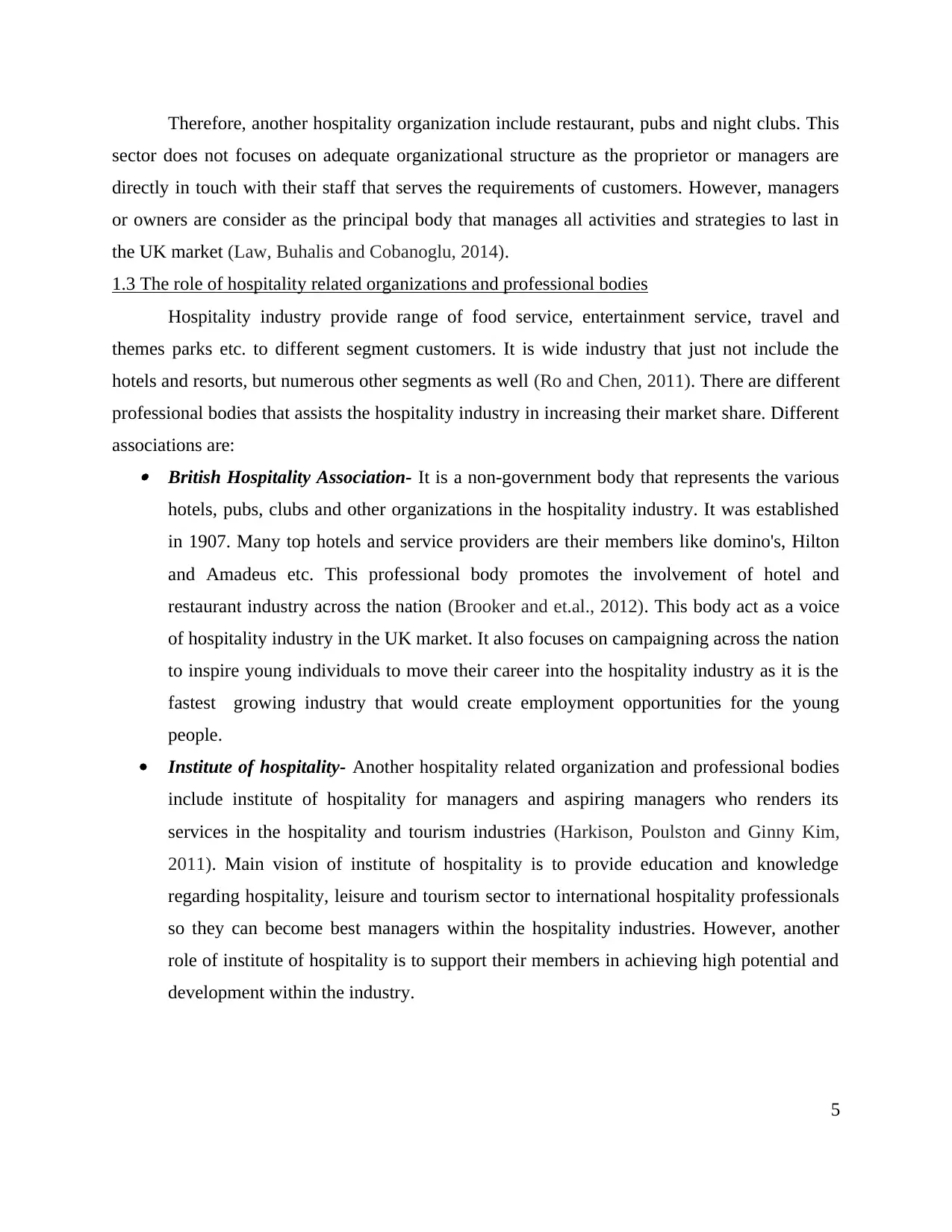
Therefore, another hospitality organization include restaurant, pubs and night clubs. This
sector does not focuses on adequate organizational structure as the proprietor or managers are
directly in touch with their staff that serves the requirements of customers. However, managers
or owners are consider as the principal body that manages all activities and strategies to last in
the UK market (Law, Buhalis and Cobanoglu, 2014).
1.3 The role of hospitality related organizations and professional bodies
Hospitality industry provide range of food service, entertainment service, travel and
themes parks etc. to different segment customers. It is wide industry that just not include the
hotels and resorts, but numerous other segments as well (Ro and Chen, 2011). There are different
professional bodies that assists the hospitality industry in increasing their market share. Different
associations are: British Hospitality Association- It is a non-government body that represents the various
hotels, pubs, clubs and other organizations in the hospitality industry. It was established
in 1907. Many top hotels and service providers are their members like domino's, Hilton
and Amadeus etc. This professional body promotes the involvement of hotel and
restaurant industry across the nation (Brooker and et.al., 2012). This body act as a voice
of hospitality industry in the UK market. It also focuses on campaigning across the nation
to inspire young individuals to move their career into the hospitality industry as it is the
fastest growing industry that would create employment opportunities for the young
people.
Institute of hospitality- Another hospitality related organization and professional bodies
include institute of hospitality for managers and aspiring managers who renders its
services in the hospitality and tourism industries (Harkison, Poulston and Ginny Kim,
2011). Main vision of institute of hospitality is to provide education and knowledge
regarding hospitality, leisure and tourism sector to international hospitality professionals
so they can become best managers within the hospitality industries. However, another
role of institute of hospitality is to support their members in achieving high potential and
development within the industry.
5
sector does not focuses on adequate organizational structure as the proprietor or managers are
directly in touch with their staff that serves the requirements of customers. However, managers
or owners are consider as the principal body that manages all activities and strategies to last in
the UK market (Law, Buhalis and Cobanoglu, 2014).
1.3 The role of hospitality related organizations and professional bodies
Hospitality industry provide range of food service, entertainment service, travel and
themes parks etc. to different segment customers. It is wide industry that just not include the
hotels and resorts, but numerous other segments as well (Ro and Chen, 2011). There are different
professional bodies that assists the hospitality industry in increasing their market share. Different
associations are: British Hospitality Association- It is a non-government body that represents the various
hotels, pubs, clubs and other organizations in the hospitality industry. It was established
in 1907. Many top hotels and service providers are their members like domino's, Hilton
and Amadeus etc. This professional body promotes the involvement of hotel and
restaurant industry across the nation (Brooker and et.al., 2012). This body act as a voice
of hospitality industry in the UK market. It also focuses on campaigning across the nation
to inspire young individuals to move their career into the hospitality industry as it is the
fastest growing industry that would create employment opportunities for the young
people.
Institute of hospitality- Another hospitality related organization and professional bodies
include institute of hospitality for managers and aspiring managers who renders its
services in the hospitality and tourism industries (Harkison, Poulston and Ginny Kim,
2011). Main vision of institute of hospitality is to provide education and knowledge
regarding hospitality, leisure and tourism sector to international hospitality professionals
so they can become best managers within the hospitality industries. However, another
role of institute of hospitality is to support their members in achieving high potential and
development within the industry.
5
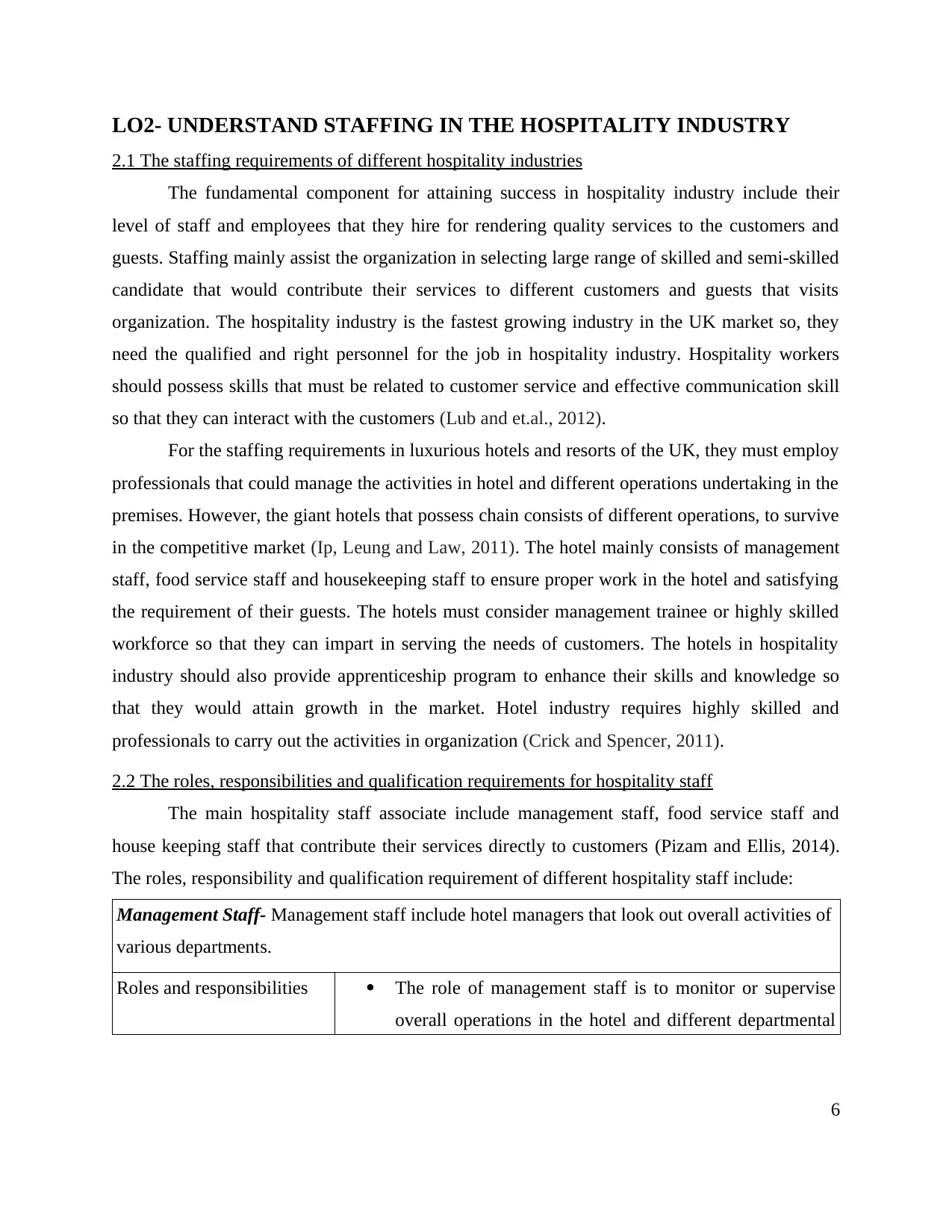
LO2- UNDERSTAND STAFFING IN THE HOSPITALITY INDUSTRY
2.1 The staffing requirements of different hospitality industries
The fundamental component for attaining success in hospitality industry include their
level of staff and employees that they hire for rendering quality services to the customers and
guests. Staffing mainly assist the organization in selecting large range of skilled and semi-skilled
candidate that would contribute their services to different customers and guests that visits
organization. The hospitality industry is the fastest growing industry in the UK market so, they
need the qualified and right personnel for the job in hospitality industry. Hospitality workers
should possess skills that must be related to customer service and effective communication skill
so that they can interact with the customers (Lub and et.al., 2012).
For the staffing requirements in luxurious hotels and resorts of the UK, they must employ
professionals that could manage the activities in hotel and different operations undertaking in the
premises. However, the giant hotels that possess chain consists of different operations, to survive
in the competitive market (Ip, Leung and Law, 2011). The hotel mainly consists of management
staff, food service staff and housekeeping staff to ensure proper work in the hotel and satisfying
the requirement of their guests. The hotels must consider management trainee or highly skilled
workforce so that they can impart in serving the needs of customers. The hotels in hospitality
industry should also provide apprenticeship program to enhance their skills and knowledge so
that they would attain growth in the market. Hotel industry requires highly skilled and
professionals to carry out the activities in organization (Crick and Spencer, 2011).
2.2 The roles, responsibilities and qualification requirements for hospitality staff
The main hospitality staff associate include management staff, food service staff and
house keeping staff that contribute their services directly to customers (Pizam and Ellis, 2014).
The roles, responsibility and qualification requirement of different hospitality staff include:
Management Staff- Management staff include hotel managers that look out overall activities of
various departments.
Roles and responsibilities The role of management staff is to monitor or supervise
overall operations in the hotel and different departmental
6
2.1 The staffing requirements of different hospitality industries
The fundamental component for attaining success in hospitality industry include their
level of staff and employees that they hire for rendering quality services to the customers and
guests. Staffing mainly assist the organization in selecting large range of skilled and semi-skilled
candidate that would contribute their services to different customers and guests that visits
organization. The hospitality industry is the fastest growing industry in the UK market so, they
need the qualified and right personnel for the job in hospitality industry. Hospitality workers
should possess skills that must be related to customer service and effective communication skill
so that they can interact with the customers (Lub and et.al., 2012).
For the staffing requirements in luxurious hotels and resorts of the UK, they must employ
professionals that could manage the activities in hotel and different operations undertaking in the
premises. However, the giant hotels that possess chain consists of different operations, to survive
in the competitive market (Ip, Leung and Law, 2011). The hotel mainly consists of management
staff, food service staff and housekeeping staff to ensure proper work in the hotel and satisfying
the requirement of their guests. The hotels must consider management trainee or highly skilled
workforce so that they can impart in serving the needs of customers. The hotels in hospitality
industry should also provide apprenticeship program to enhance their skills and knowledge so
that they would attain growth in the market. Hotel industry requires highly skilled and
professionals to carry out the activities in organization (Crick and Spencer, 2011).
2.2 The roles, responsibilities and qualification requirements for hospitality staff
The main hospitality staff associate include management staff, food service staff and
house keeping staff that contribute their services directly to customers (Pizam and Ellis, 2014).
The roles, responsibility and qualification requirement of different hospitality staff include:
Management Staff- Management staff include hotel managers that look out overall activities of
various departments.
Roles and responsibilities The role of management staff is to monitor or supervise
overall operations in the hotel and different departmental
6
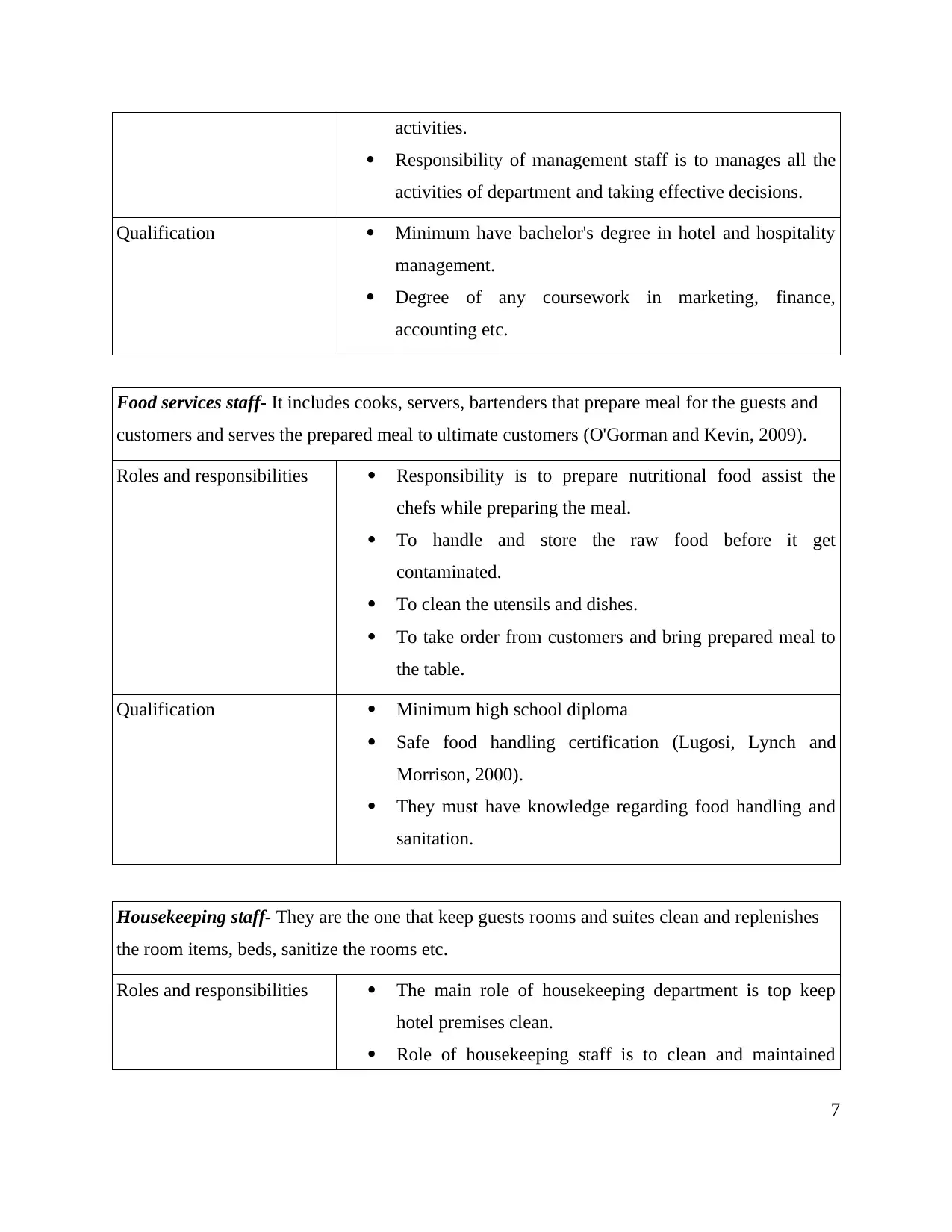
activities.
Responsibility of management staff is to manages all the
activities of department and taking effective decisions.
Qualification Minimum have bachelor's degree in hotel and hospitality
management.
Degree of any coursework in marketing, finance,
accounting etc.
Food services staff- It includes cooks, servers, bartenders that prepare meal for the guests and
customers and serves the prepared meal to ultimate customers (O'Gorman and Kevin, 2009).
Roles and responsibilities Responsibility is to prepare nutritional food assist the
chefs while preparing the meal.
To handle and store the raw food before it get
contaminated.
To clean the utensils and dishes.
To take order from customers and bring prepared meal to
the table.
Qualification Minimum high school diploma
Safe food handling certification (Lugosi, Lynch and
Morrison, 2000).
They must have knowledge regarding food handling and
sanitation.
Housekeeping staff- They are the one that keep guests rooms and suites clean and replenishes
the room items, beds, sanitize the rooms etc.
Roles and responsibilities The main role of housekeeping department is top keep
hotel premises clean.
Role of housekeeping staff is to clean and maintained
7
Responsibility of management staff is to manages all the
activities of department and taking effective decisions.
Qualification Minimum have bachelor's degree in hotel and hospitality
management.
Degree of any coursework in marketing, finance,
accounting etc.
Food services staff- It includes cooks, servers, bartenders that prepare meal for the guests and
customers and serves the prepared meal to ultimate customers (O'Gorman and Kevin, 2009).
Roles and responsibilities Responsibility is to prepare nutritional food assist the
chefs while preparing the meal.
To handle and store the raw food before it get
contaminated.
To clean the utensils and dishes.
To take order from customers and bring prepared meal to
the table.
Qualification Minimum high school diploma
Safe food handling certification (Lugosi, Lynch and
Morrison, 2000).
They must have knowledge regarding food handling and
sanitation.
Housekeeping staff- They are the one that keep guests rooms and suites clean and replenishes
the room items, beds, sanitize the rooms etc.
Roles and responsibilities The main role of housekeeping department is top keep
hotel premises clean.
Role of housekeeping staff is to clean and maintained
7
Paraphrase This Document
Need a fresh take? Get an instant paraphrase of this document with our AI Paraphraser
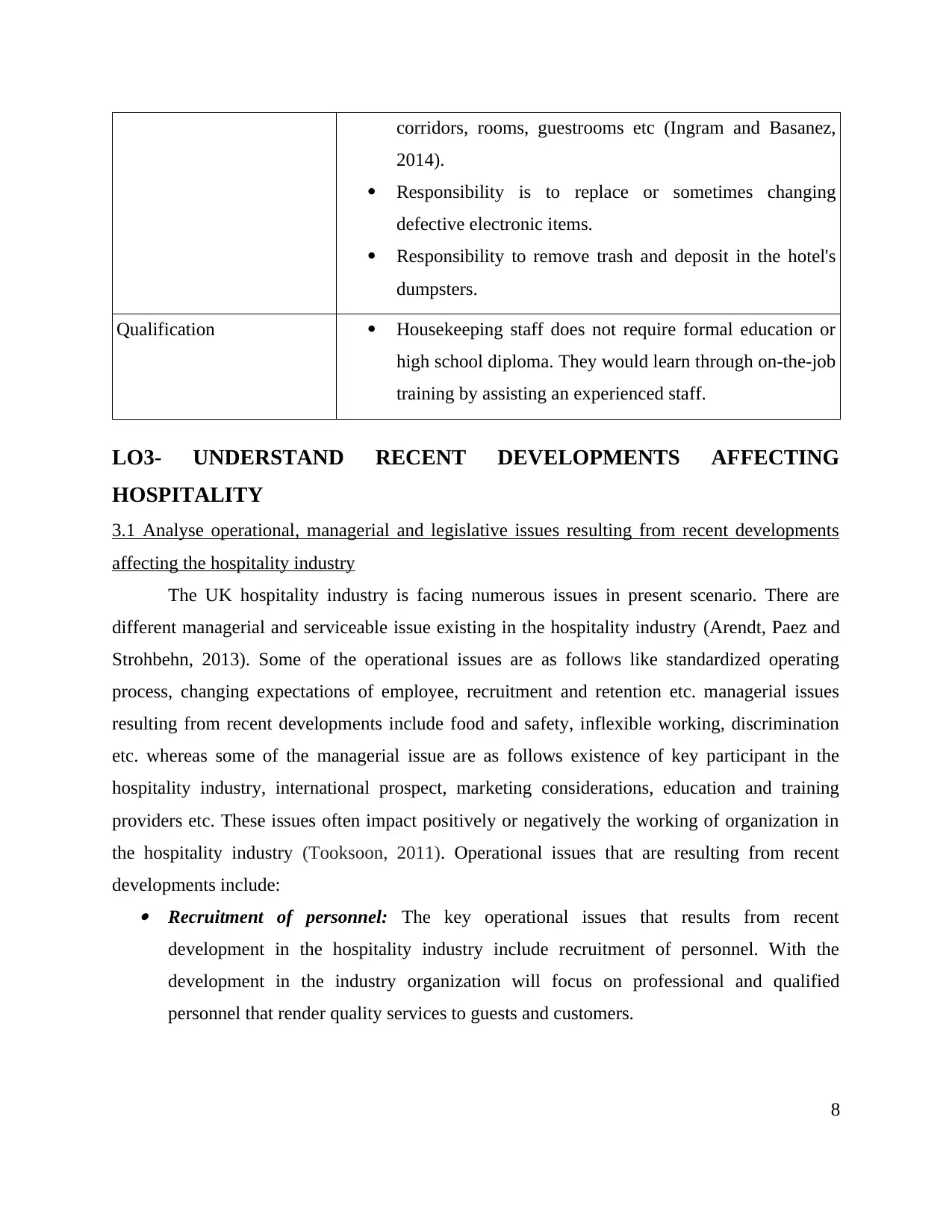
corridors, rooms, guestrooms etc (Ingram and Basanez,
2014).
Responsibility is to replace or sometimes changing
defective electronic items.
Responsibility to remove trash and deposit in the hotel's
dumpsters.
Qualification Housekeeping staff does not require formal education or
high school diploma. They would learn through on-the-job
training by assisting an experienced staff.
LO3- UNDERSTAND RECENT DEVELOPMENTS AFFECTING
HOSPITALITY
3.1 Analyse operational, managerial and legislative issues resulting from recent developments
affecting the hospitality industry
The UK hospitality industry is facing numerous issues in present scenario. There are
different managerial and serviceable issue existing in the hospitality industry (Arendt, Paez and
Strohbehn, 2013). Some of the operational issues are as follows like standardized operating
process, changing expectations of employee, recruitment and retention etc. managerial issues
resulting from recent developments include food and safety, inflexible working, discrimination
etc. whereas some of the managerial issue are as follows existence of key participant in the
hospitality industry, international prospect, marketing considerations, education and training
providers etc. These issues often impact positively or negatively the working of organization in
the hospitality industry (Tooksoon, 2011). Operational issues that are resulting from recent
developments include: Recruitment of personnel: The key operational issues that results from recent
development in the hospitality industry include recruitment of personnel. With the
development in the industry organization will focus on professional and qualified
personnel that render quality services to guests and customers.
8
2014).
Responsibility is to replace or sometimes changing
defective electronic items.
Responsibility to remove trash and deposit in the hotel's
dumpsters.
Qualification Housekeeping staff does not require formal education or
high school diploma. They would learn through on-the-job
training by assisting an experienced staff.
LO3- UNDERSTAND RECENT DEVELOPMENTS AFFECTING
HOSPITALITY
3.1 Analyse operational, managerial and legislative issues resulting from recent developments
affecting the hospitality industry
The UK hospitality industry is facing numerous issues in present scenario. There are
different managerial and serviceable issue existing in the hospitality industry (Arendt, Paez and
Strohbehn, 2013). Some of the operational issues are as follows like standardized operating
process, changing expectations of employee, recruitment and retention etc. managerial issues
resulting from recent developments include food and safety, inflexible working, discrimination
etc. whereas some of the managerial issue are as follows existence of key participant in the
hospitality industry, international prospect, marketing considerations, education and training
providers etc. These issues often impact positively or negatively the working of organization in
the hospitality industry (Tooksoon, 2011). Operational issues that are resulting from recent
developments include: Recruitment of personnel: The key operational issues that results from recent
development in the hospitality industry include recruitment of personnel. With the
development in the industry organization will focus on professional and qualified
personnel that render quality services to guests and customers.
8
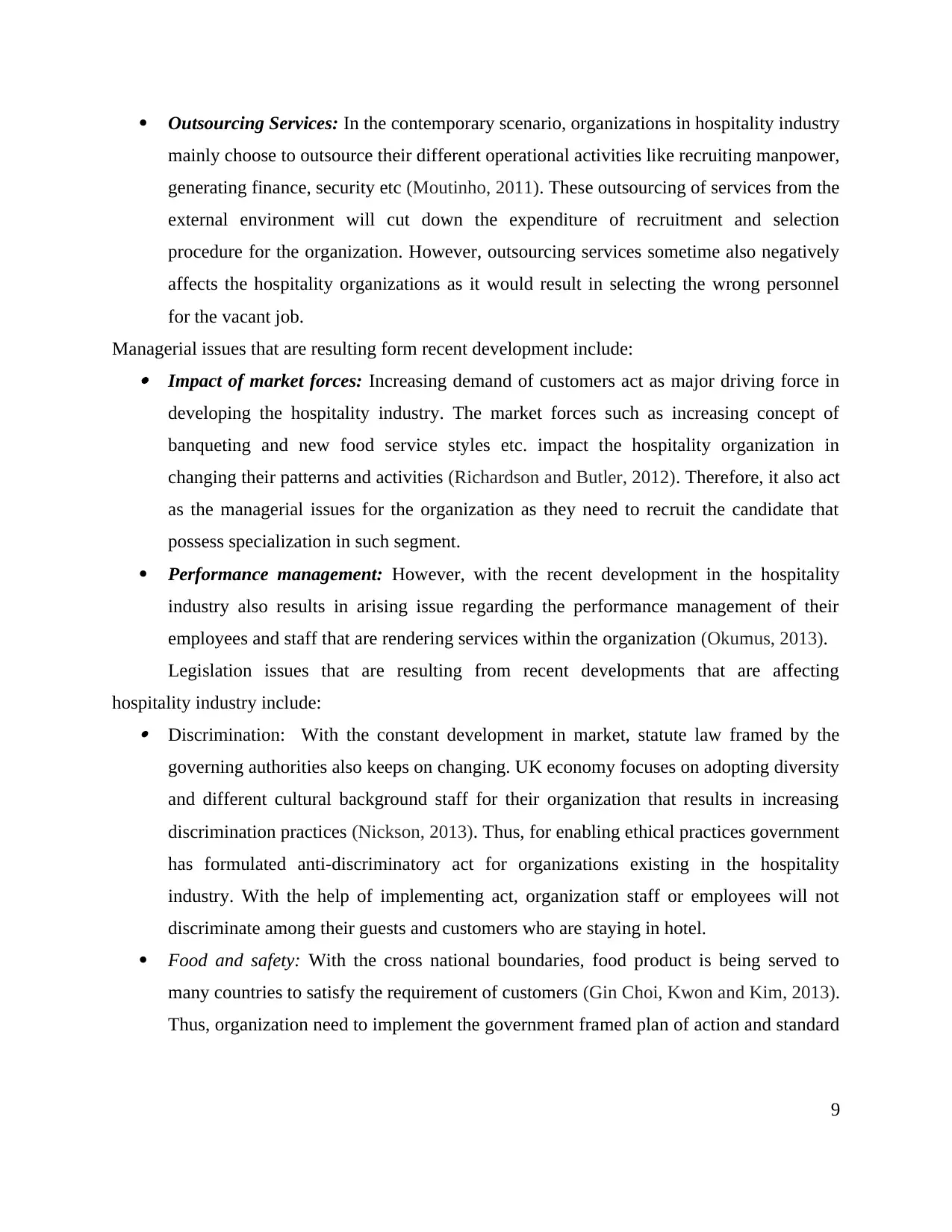
Outsourcing Services: In the contemporary scenario, organizations in hospitality industry
mainly choose to outsource their different operational activities like recruiting manpower,
generating finance, security etc (Moutinho, 2011). These outsourcing of services from the
external environment will cut down the expenditure of recruitment and selection
procedure for the organization. However, outsourcing services sometime also negatively
affects the hospitality organizations as it would result in selecting the wrong personnel
for the vacant job.
Managerial issues that are resulting form recent development include: Impact of market forces: Increasing demand of customers act as major driving force in
developing the hospitality industry. The market forces such as increasing concept of
banqueting and new food service styles etc. impact the hospitality organization in
changing their patterns and activities (Richardson and Butler, 2012). Therefore, it also act
as the managerial issues for the organization as they need to recruit the candidate that
possess specialization in such segment.
Performance management: However, with the recent development in the hospitality
industry also results in arising issue regarding the performance management of their
employees and staff that are rendering services within the organization (Okumus, 2013).
Legislation issues that are resulting from recent developments that are affecting
hospitality industry include: Discrimination: With the constant development in market, statute law framed by the
governing authorities also keeps on changing. UK economy focuses on adopting diversity
and different cultural background staff for their organization that results in increasing
discrimination practices (Nickson, 2013). Thus, for enabling ethical practices government
has formulated anti-discriminatory act for organizations existing in the hospitality
industry. With the help of implementing act, organization staff or employees will not
discriminate among their guests and customers who are staying in hotel.
Food and safety: With the cross national boundaries, food product is being served to
many countries to satisfy the requirement of customers (Gin Choi, Kwon and Kim, 2013).
Thus, organization need to implement the government framed plan of action and standard
9
mainly choose to outsource their different operational activities like recruiting manpower,
generating finance, security etc (Moutinho, 2011). These outsourcing of services from the
external environment will cut down the expenditure of recruitment and selection
procedure for the organization. However, outsourcing services sometime also negatively
affects the hospitality organizations as it would result in selecting the wrong personnel
for the vacant job.
Managerial issues that are resulting form recent development include: Impact of market forces: Increasing demand of customers act as major driving force in
developing the hospitality industry. The market forces such as increasing concept of
banqueting and new food service styles etc. impact the hospitality organization in
changing their patterns and activities (Richardson and Butler, 2012). Therefore, it also act
as the managerial issues for the organization as they need to recruit the candidate that
possess specialization in such segment.
Performance management: However, with the recent development in the hospitality
industry also results in arising issue regarding the performance management of their
employees and staff that are rendering services within the organization (Okumus, 2013).
Legislation issues that are resulting from recent developments that are affecting
hospitality industry include: Discrimination: With the constant development in market, statute law framed by the
governing authorities also keeps on changing. UK economy focuses on adopting diversity
and different cultural background staff for their organization that results in increasing
discrimination practices (Nickson, 2013). Thus, for enabling ethical practices government
has formulated anti-discriminatory act for organizations existing in the hospitality
industry. With the help of implementing act, organization staff or employees will not
discriminate among their guests and customers who are staying in hotel.
Food and safety: With the cross national boundaries, food product is being served to
many countries to satisfy the requirement of customers (Gin Choi, Kwon and Kim, 2013).
Thus, organization need to implement the government framed plan of action and standard
9
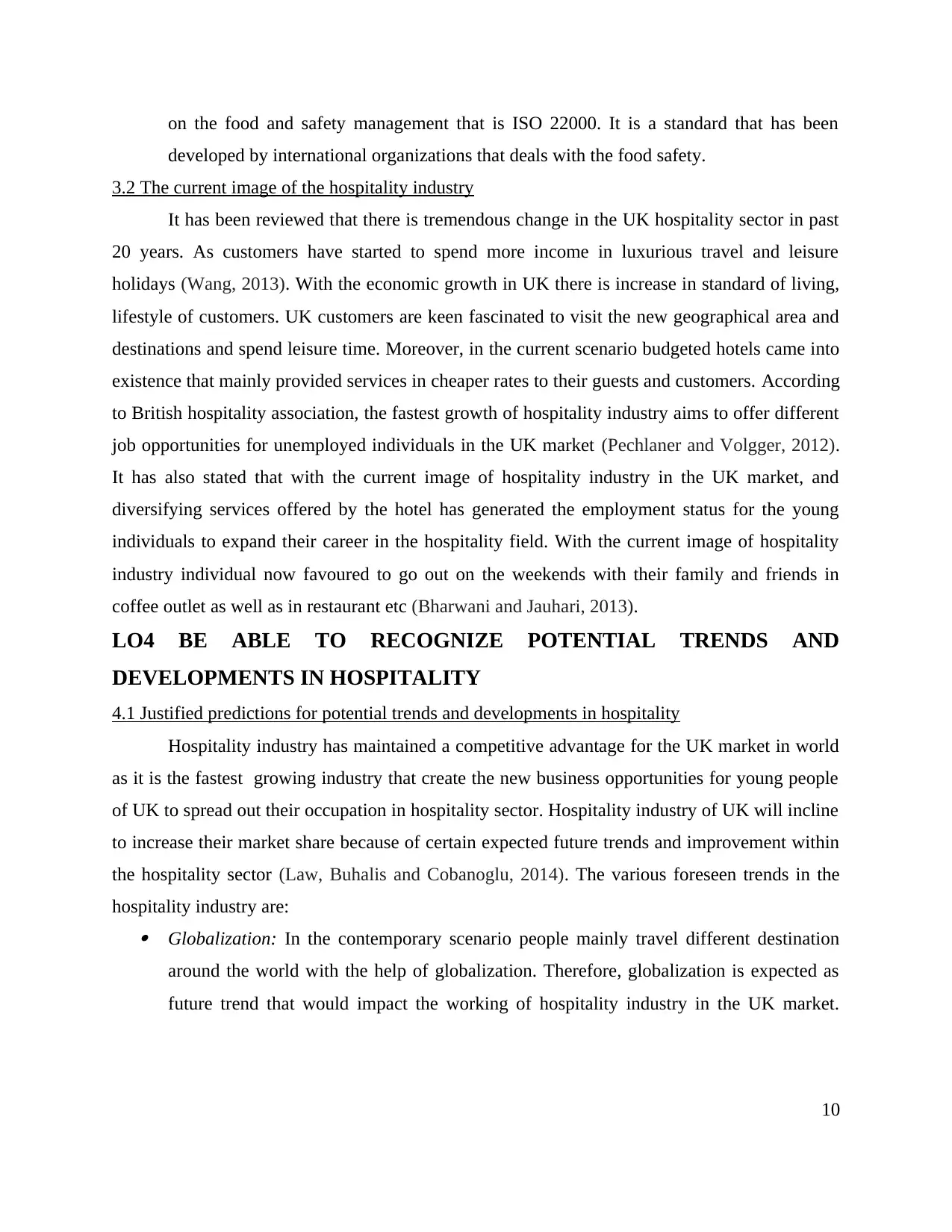
on the food and safety management that is ISO 22000. It is a standard that has been
developed by international organizations that deals with the food safety.
3.2 The current image of the hospitality industry
It has been reviewed that there is tremendous change in the UK hospitality sector in past
20 years. As customers have started to spend more income in luxurious travel and leisure
holidays (Wang, 2013). With the economic growth in UK there is increase in standard of living,
lifestyle of customers. UK customers are keen fascinated to visit the new geographical area and
destinations and spend leisure time. Moreover, in the current scenario budgeted hotels came into
existence that mainly provided services in cheaper rates to their guests and customers. According
to British hospitality association, the fastest growth of hospitality industry aims to offer different
job opportunities for unemployed individuals in the UK market (Pechlaner and Volgger, 2012).
It has also stated that with the current image of hospitality industry in the UK market, and
diversifying services offered by the hotel has generated the employment status for the young
individuals to expand their career in the hospitality field. With the current image of hospitality
industry individual now favoured to go out on the weekends with their family and friends in
coffee outlet as well as in restaurant etc (Bharwani and Jauhari, 2013).
LO4 BE ABLE TO RECOGNIZE POTENTIAL TRENDS AND
DEVELOPMENTS IN HOSPITALITY
4.1 Justified predictions for potential trends and developments in hospitality
Hospitality industry has maintained a competitive advantage for the UK market in world
as it is the fastest growing industry that create the new business opportunities for young people
of UK to spread out their occupation in hospitality sector. Hospitality industry of UK will incline
to increase their market share because of certain expected future trends and improvement within
the hospitality sector (Law, Buhalis and Cobanoglu, 2014). The various foreseen trends in the
hospitality industry are: Globalization: In the contemporary scenario people mainly travel different destination
around the world with the help of globalization. Therefore, globalization is expected as
future trend that would impact the working of hospitality industry in the UK market.
10
developed by international organizations that deals with the food safety.
3.2 The current image of the hospitality industry
It has been reviewed that there is tremendous change in the UK hospitality sector in past
20 years. As customers have started to spend more income in luxurious travel and leisure
holidays (Wang, 2013). With the economic growth in UK there is increase in standard of living,
lifestyle of customers. UK customers are keen fascinated to visit the new geographical area and
destinations and spend leisure time. Moreover, in the current scenario budgeted hotels came into
existence that mainly provided services in cheaper rates to their guests and customers. According
to British hospitality association, the fastest growth of hospitality industry aims to offer different
job opportunities for unemployed individuals in the UK market (Pechlaner and Volgger, 2012).
It has also stated that with the current image of hospitality industry in the UK market, and
diversifying services offered by the hotel has generated the employment status for the young
individuals to expand their career in the hospitality field. With the current image of hospitality
industry individual now favoured to go out on the weekends with their family and friends in
coffee outlet as well as in restaurant etc (Bharwani and Jauhari, 2013).
LO4 BE ABLE TO RECOGNIZE POTENTIAL TRENDS AND
DEVELOPMENTS IN HOSPITALITY
4.1 Justified predictions for potential trends and developments in hospitality
Hospitality industry has maintained a competitive advantage for the UK market in world
as it is the fastest growing industry that create the new business opportunities for young people
of UK to spread out their occupation in hospitality sector. Hospitality industry of UK will incline
to increase their market share because of certain expected future trends and improvement within
the hospitality sector (Law, Buhalis and Cobanoglu, 2014). The various foreseen trends in the
hospitality industry are: Globalization: In the contemporary scenario people mainly travel different destination
around the world with the help of globalization. Therefore, globalization is expected as
future trend that would impact the working of hospitality industry in the UK market.
10
Secure Best Marks with AI Grader
Need help grading? Try our AI Grader for instant feedback on your assignments.
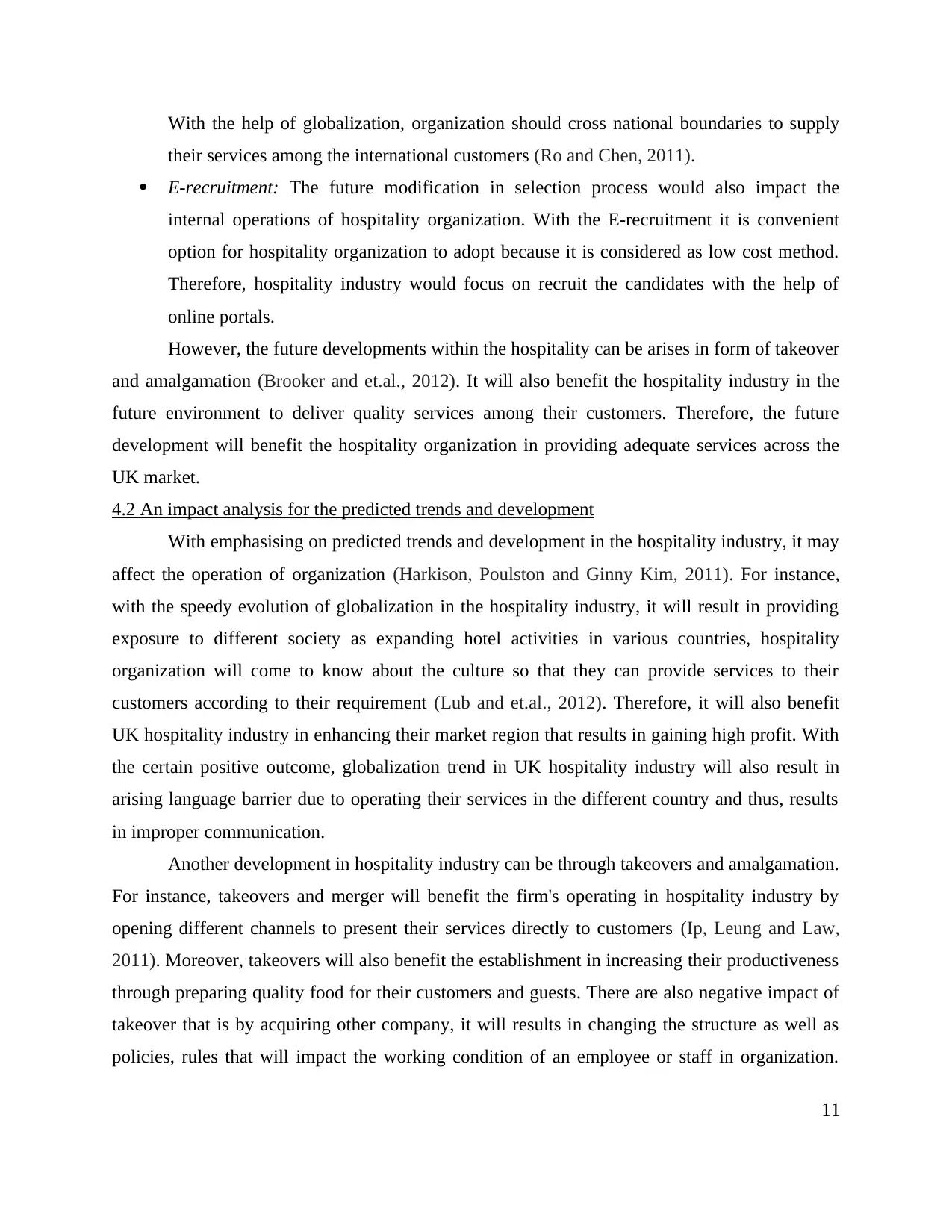
With the help of globalization, organization should cross national boundaries to supply
their services among the international customers (Ro and Chen, 2011).
E-recruitment: The future modification in selection process would also impact the
internal operations of hospitality organization. With the E-recruitment it is convenient
option for hospitality organization to adopt because it is considered as low cost method.
Therefore, hospitality industry would focus on recruit the candidates with the help of
online portals.
However, the future developments within the hospitality can be arises in form of takeover
and amalgamation (Brooker and et.al., 2012). It will also benefit the hospitality industry in the
future environment to deliver quality services among their customers. Therefore, the future
development will benefit the hospitality organization in providing adequate services across the
UK market.
4.2 An impact analysis for the predicted trends and development
With emphasising on predicted trends and development in the hospitality industry, it may
affect the operation of organization (Harkison, Poulston and Ginny Kim, 2011). For instance,
with the speedy evolution of globalization in the hospitality industry, it will result in providing
exposure to different society as expanding hotel activities in various countries, hospitality
organization will come to know about the culture so that they can provide services to their
customers according to their requirement (Lub and et.al., 2012). Therefore, it will also benefit
UK hospitality industry in enhancing their market region that results in gaining high profit. With
the certain positive outcome, globalization trend in UK hospitality industry will also result in
arising language barrier due to operating their services in the different country and thus, results
in improper communication.
Another development in hospitality industry can be through takeovers and amalgamation.
For instance, takeovers and merger will benefit the firm's operating in hospitality industry by
opening different channels to present their services directly to customers (Ip, Leung and Law,
2011). Moreover, takeovers will also benefit the establishment in increasing their productiveness
through preparing quality food for their customers and guests. There are also negative impact of
takeover that is by acquiring other company, it will results in changing the structure as well as
policies, rules that will impact the working condition of an employee or staff in organization.
11
their services among the international customers (Ro and Chen, 2011).
E-recruitment: The future modification in selection process would also impact the
internal operations of hospitality organization. With the E-recruitment it is convenient
option for hospitality organization to adopt because it is considered as low cost method.
Therefore, hospitality industry would focus on recruit the candidates with the help of
online portals.
However, the future developments within the hospitality can be arises in form of takeover
and amalgamation (Brooker and et.al., 2012). It will also benefit the hospitality industry in the
future environment to deliver quality services among their customers. Therefore, the future
development will benefit the hospitality organization in providing adequate services across the
UK market.
4.2 An impact analysis for the predicted trends and development
With emphasising on predicted trends and development in the hospitality industry, it may
affect the operation of organization (Harkison, Poulston and Ginny Kim, 2011). For instance,
with the speedy evolution of globalization in the hospitality industry, it will result in providing
exposure to different society as expanding hotel activities in various countries, hospitality
organization will come to know about the culture so that they can provide services to their
customers according to their requirement (Lub and et.al., 2012). Therefore, it will also benefit
UK hospitality industry in enhancing their market region that results in gaining high profit. With
the certain positive outcome, globalization trend in UK hospitality industry will also result in
arising language barrier due to operating their services in the different country and thus, results
in improper communication.
Another development in hospitality industry can be through takeovers and amalgamation.
For instance, takeovers and merger will benefit the firm's operating in hospitality industry by
opening different channels to present their services directly to customers (Ip, Leung and Law,
2011). Moreover, takeovers will also benefit the establishment in increasing their productiveness
through preparing quality food for their customers and guests. There are also negative impact of
takeover that is by acquiring other company, it will results in changing the structure as well as
policies, rules that will impact the working condition of an employee or staff in organization.
11
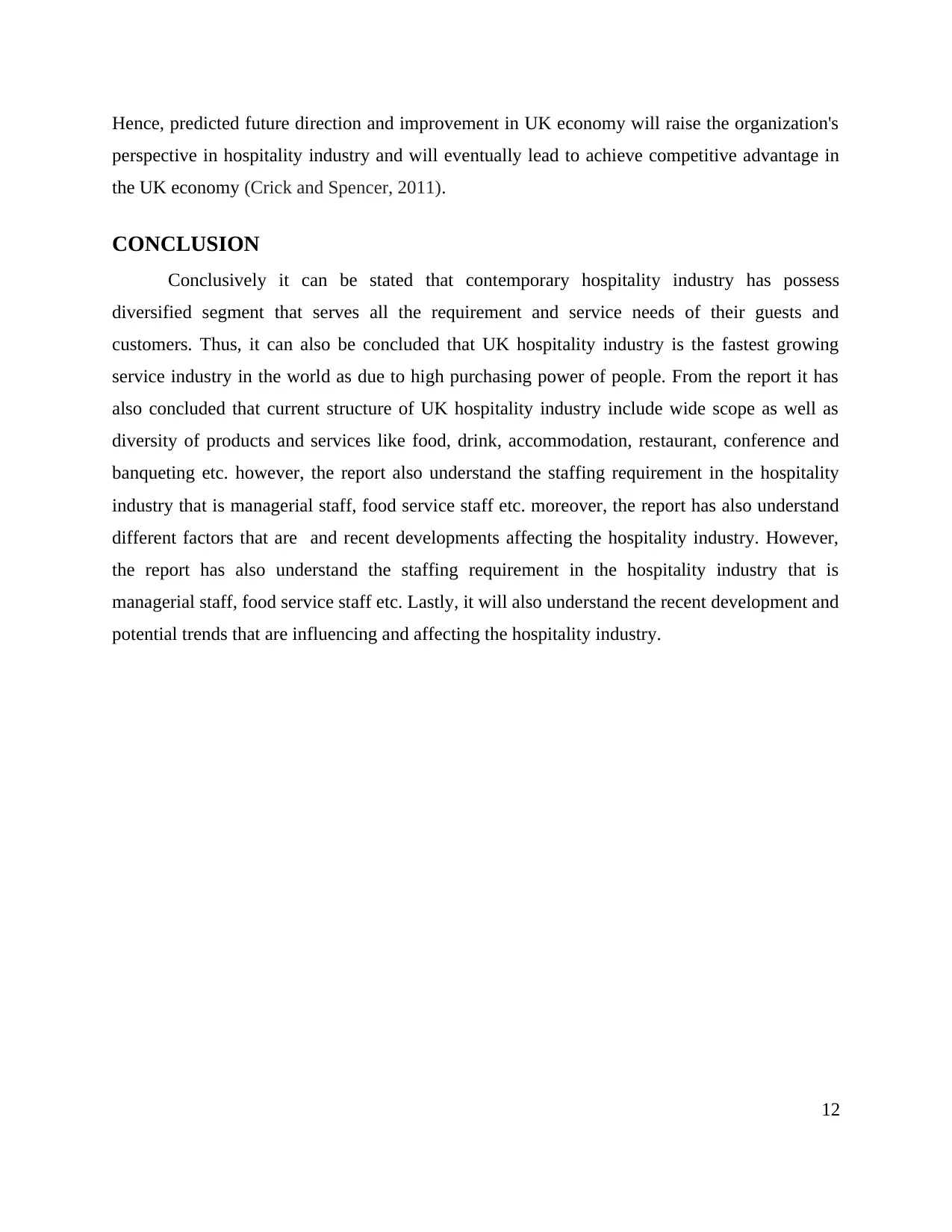
Hence, predicted future direction and improvement in UK economy will raise the organization's
perspective in hospitality industry and will eventually lead to achieve competitive advantage in
the UK economy (Crick and Spencer, 2011).
CONCLUSION
Conclusively it can be stated that contemporary hospitality industry has possess
diversified segment that serves all the requirement and service needs of their guests and
customers. Thus, it can also be concluded that UK hospitality industry is the fastest growing
service industry in the world as due to high purchasing power of people. From the report it has
also concluded that current structure of UK hospitality industry include wide scope as well as
diversity of products and services like food, drink, accommodation, restaurant, conference and
banqueting etc. however, the report also understand the staffing requirement in the hospitality
industry that is managerial staff, food service staff etc. moreover, the report has also understand
different factors that are and recent developments affecting the hospitality industry. However,
the report has also understand the staffing requirement in the hospitality industry that is
managerial staff, food service staff etc. Lastly, it will also understand the recent development and
potential trends that are influencing and affecting the hospitality industry.
12
perspective in hospitality industry and will eventually lead to achieve competitive advantage in
the UK economy (Crick and Spencer, 2011).
CONCLUSION
Conclusively it can be stated that contemporary hospitality industry has possess
diversified segment that serves all the requirement and service needs of their guests and
customers. Thus, it can also be concluded that UK hospitality industry is the fastest growing
service industry in the world as due to high purchasing power of people. From the report it has
also concluded that current structure of UK hospitality industry include wide scope as well as
diversity of products and services like food, drink, accommodation, restaurant, conference and
banqueting etc. however, the report also understand the staffing requirement in the hospitality
industry that is managerial staff, food service staff etc. moreover, the report has also understand
different factors that are and recent developments affecting the hospitality industry. However,
the report has also understand the staffing requirement in the hospitality industry that is
managerial staff, food service staff etc. Lastly, it will also understand the recent development and
potential trends that are influencing and affecting the hospitality industry.
12
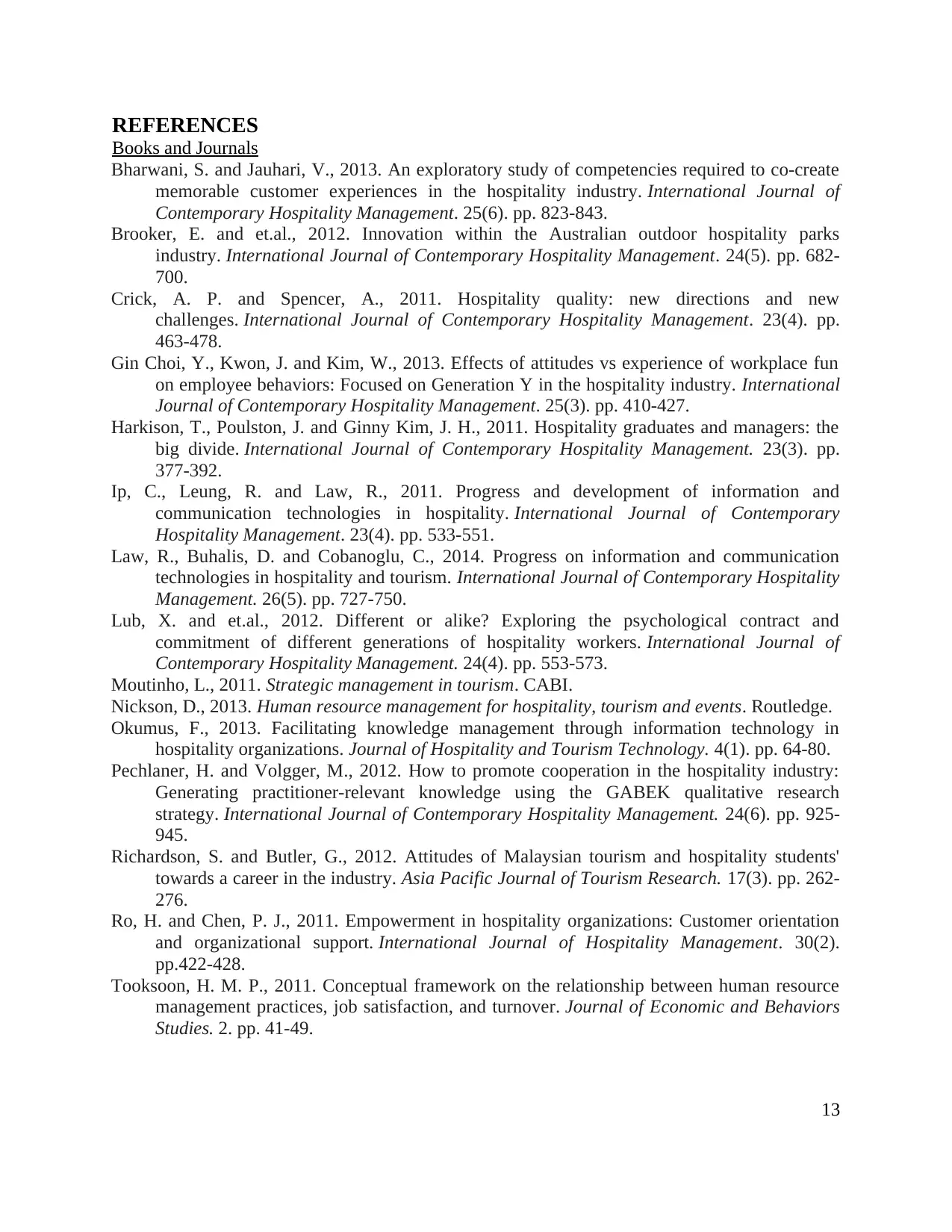
REFERENCES
Books and Journals
Bharwani, S. and Jauhari, V., 2013. An exploratory study of competencies required to co-create
memorable customer experiences in the hospitality industry. International Journal of
Contemporary Hospitality Management. 25(6). pp. 823-843.
Brooker, E. and et.al., 2012. Innovation within the Australian outdoor hospitality parks
industry. International Journal of Contemporary Hospitality Management. 24(5). pp. 682-
700.
Crick, A. P. and Spencer, A., 2011. Hospitality quality: new directions and new
challenges. International Journal of Contemporary Hospitality Management. 23(4). pp.
463-478.
Gin Choi, Y., Kwon, J. and Kim, W., 2013. Effects of attitudes vs experience of workplace fun
on employee behaviors: Focused on Generation Y in the hospitality industry. International
Journal of Contemporary Hospitality Management. 25(3). pp. 410-427.
Harkison, T., Poulston, J. and Ginny Kim, J. H., 2011. Hospitality graduates and managers: the
big divide. International Journal of Contemporary Hospitality Management. 23(3). pp.
377-392.
Ip, C., Leung, R. and Law, R., 2011. Progress and development of information and
communication technologies in hospitality. International Journal of Contemporary
Hospitality Management. 23(4). pp. 533-551.
Law, R., Buhalis, D. and Cobanoglu, C., 2014. Progress on information and communication
technologies in hospitality and tourism. International Journal of Contemporary Hospitality
Management. 26(5). pp. 727-750.
Lub, X. and et.al., 2012. Different or alike? Exploring the psychological contract and
commitment of different generations of hospitality workers. International Journal of
Contemporary Hospitality Management. 24(4). pp. 553-573.
Moutinho, L., 2011. Strategic management in tourism. CABI.
Nickson, D., 2013. Human resource management for hospitality, tourism and events. Routledge.
Okumus, F., 2013. Facilitating knowledge management through information technology in
hospitality organizations. Journal of Hospitality and Tourism Technology. 4(1). pp. 64-80.
Pechlaner, H. and Volgger, M., 2012. How to promote cooperation in the hospitality industry:
Generating practitioner-relevant knowledge using the GABEK qualitative research
strategy. International Journal of Contemporary Hospitality Management. 24(6). pp. 925-
945.
Richardson, S. and Butler, G., 2012. Attitudes of Malaysian tourism and hospitality students'
towards a career in the industry. Asia Pacific Journal of Tourism Research. 17(3). pp. 262-
276.
Ro, H. and Chen, P. J., 2011. Empowerment in hospitality organizations: Customer orientation
and organizational support. International Journal of Hospitality Management. 30(2).
pp.422-428.
Tooksoon, H. M. P., 2011. Conceptual framework on the relationship between human resource
management practices, job satisfaction, and turnover. Journal of Economic and Behaviors
Studies. 2. pp. 41-49.
13
Books and Journals
Bharwani, S. and Jauhari, V., 2013. An exploratory study of competencies required to co-create
memorable customer experiences in the hospitality industry. International Journal of
Contemporary Hospitality Management. 25(6). pp. 823-843.
Brooker, E. and et.al., 2012. Innovation within the Australian outdoor hospitality parks
industry. International Journal of Contemporary Hospitality Management. 24(5). pp. 682-
700.
Crick, A. P. and Spencer, A., 2011. Hospitality quality: new directions and new
challenges. International Journal of Contemporary Hospitality Management. 23(4). pp.
463-478.
Gin Choi, Y., Kwon, J. and Kim, W., 2013. Effects of attitudes vs experience of workplace fun
on employee behaviors: Focused on Generation Y in the hospitality industry. International
Journal of Contemporary Hospitality Management. 25(3). pp. 410-427.
Harkison, T., Poulston, J. and Ginny Kim, J. H., 2011. Hospitality graduates and managers: the
big divide. International Journal of Contemporary Hospitality Management. 23(3). pp.
377-392.
Ip, C., Leung, R. and Law, R., 2011. Progress and development of information and
communication technologies in hospitality. International Journal of Contemporary
Hospitality Management. 23(4). pp. 533-551.
Law, R., Buhalis, D. and Cobanoglu, C., 2014. Progress on information and communication
technologies in hospitality and tourism. International Journal of Contemporary Hospitality
Management. 26(5). pp. 727-750.
Lub, X. and et.al., 2012. Different or alike? Exploring the psychological contract and
commitment of different generations of hospitality workers. International Journal of
Contemporary Hospitality Management. 24(4). pp. 553-573.
Moutinho, L., 2011. Strategic management in tourism. CABI.
Nickson, D., 2013. Human resource management for hospitality, tourism and events. Routledge.
Okumus, F., 2013. Facilitating knowledge management through information technology in
hospitality organizations. Journal of Hospitality and Tourism Technology. 4(1). pp. 64-80.
Pechlaner, H. and Volgger, M., 2012. How to promote cooperation in the hospitality industry:
Generating practitioner-relevant knowledge using the GABEK qualitative research
strategy. International Journal of Contemporary Hospitality Management. 24(6). pp. 925-
945.
Richardson, S. and Butler, G., 2012. Attitudes of Malaysian tourism and hospitality students'
towards a career in the industry. Asia Pacific Journal of Tourism Research. 17(3). pp. 262-
276.
Ro, H. and Chen, P. J., 2011. Empowerment in hospitality organizations: Customer orientation
and organizational support. International Journal of Hospitality Management. 30(2).
pp.422-428.
Tooksoon, H. M. P., 2011. Conceptual framework on the relationship between human resource
management practices, job satisfaction, and turnover. Journal of Economic and Behaviors
Studies. 2. pp. 41-49.
13
Paraphrase This Document
Need a fresh take? Get an instant paraphrase of this document with our AI Paraphraser
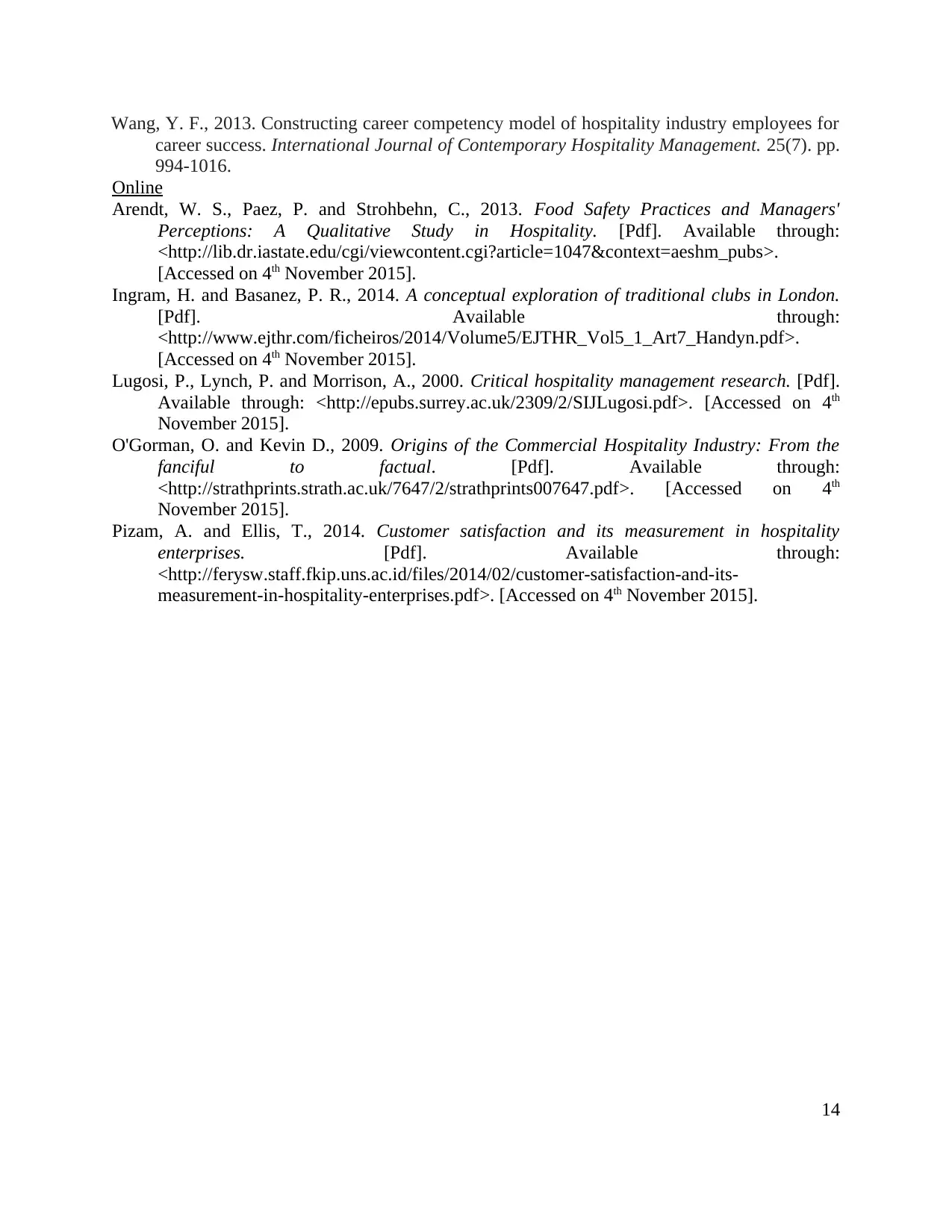
Wang, Y. F., 2013. Constructing career competency model of hospitality industry employees for
career success. International Journal of Contemporary Hospitality Management. 25(7). pp.
994-1016.
Online
Arendt, W. S., Paez, P. and Strohbehn, C., 2013. Food Safety Practices and Managers'
Perceptions: A Qualitative Study in Hospitality. [Pdf]. Available through:
<http://lib.dr.iastate.edu/cgi/viewcontent.cgi?article=1047&context=aeshm_pubs>.
[Accessed on 4th November 2015].
Ingram, H. and Basanez, P. R., 2014. A conceptual exploration of traditional clubs in London.
[Pdf]. Available through:
<http://www.ejthr.com/ficheiros/2014/Volume5/EJTHR_Vol5_1_Art7_Handyn.pdf>.
[Accessed on 4th November 2015].
Lugosi, P., Lynch, P. and Morrison, A., 2000. Critical hospitality management research. [Pdf].
Available through: <http://epubs.surrey.ac.uk/2309/2/SIJLugosi.pdf>. [Accessed on 4th
November 2015].
O'Gorman, O. and Kevin D., 2009. Origins of the Commercial Hospitality Industry: From the
fanciful to factual. [Pdf]. Available through:
<http://strathprints.strath.ac.uk/7647/2/strathprints007647.pdf>. [Accessed on 4th
November 2015].
Pizam, A. and Ellis, T., 2014. Customer satisfaction and its measurement in hospitality
enterprises. [Pdf]. Available through:
<http://ferysw.staff.fkip.uns.ac.id/files/2014/02/customer-satisfaction-and-its-
measurement-in-hospitality-enterprises.pdf>. [Accessed on 4th November 2015].
14
career success. International Journal of Contemporary Hospitality Management. 25(7). pp.
994-1016.
Online
Arendt, W. S., Paez, P. and Strohbehn, C., 2013. Food Safety Practices and Managers'
Perceptions: A Qualitative Study in Hospitality. [Pdf]. Available through:
<http://lib.dr.iastate.edu/cgi/viewcontent.cgi?article=1047&context=aeshm_pubs>.
[Accessed on 4th November 2015].
Ingram, H. and Basanez, P. R., 2014. A conceptual exploration of traditional clubs in London.
[Pdf]. Available through:
<http://www.ejthr.com/ficheiros/2014/Volume5/EJTHR_Vol5_1_Art7_Handyn.pdf>.
[Accessed on 4th November 2015].
Lugosi, P., Lynch, P. and Morrison, A., 2000. Critical hospitality management research. [Pdf].
Available through: <http://epubs.surrey.ac.uk/2309/2/SIJLugosi.pdf>. [Accessed on 4th
November 2015].
O'Gorman, O. and Kevin D., 2009. Origins of the Commercial Hospitality Industry: From the
fanciful to factual. [Pdf]. Available through:
<http://strathprints.strath.ac.uk/7647/2/strathprints007647.pdf>. [Accessed on 4th
November 2015].
Pizam, A. and Ellis, T., 2014. Customer satisfaction and its measurement in hospitality
enterprises. [Pdf]. Available through:
<http://ferysw.staff.fkip.uns.ac.id/files/2014/02/customer-satisfaction-and-its-
measurement-in-hospitality-enterprises.pdf>. [Accessed on 4th November 2015].
14
1 out of 14
Related Documents
Your All-in-One AI-Powered Toolkit for Academic Success.
+13062052269
info@desklib.com
Available 24*7 on WhatsApp / Email
![[object Object]](/_next/static/media/star-bottom.7253800d.svg)
Unlock your academic potential
© 2024 | Zucol Services PVT LTD | All rights reserved.





